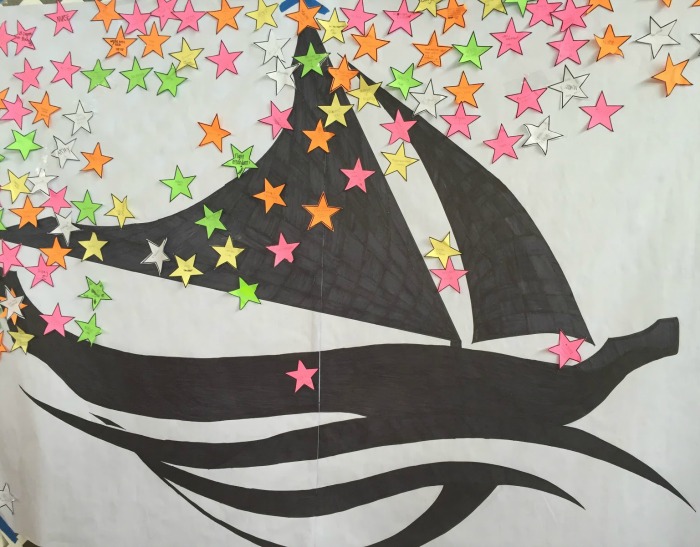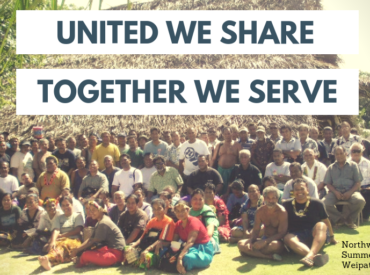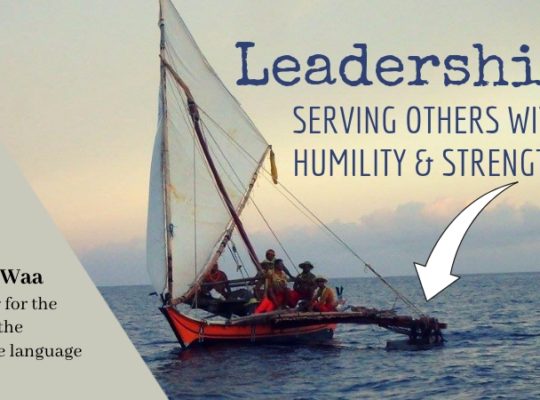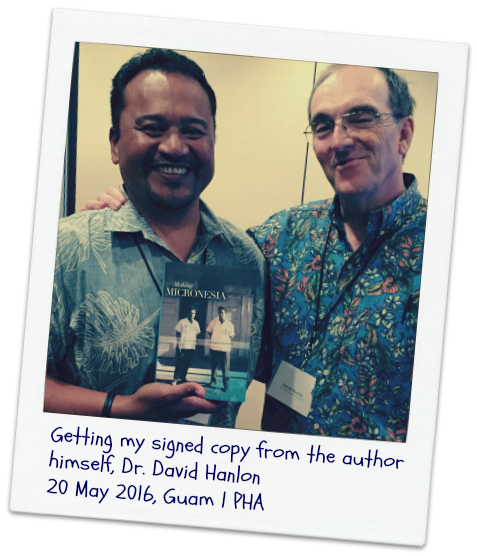“You cannot control the direction of the wind, but you can adjust your sail to always reach your destination.”
Itʻs hard to believe that today is officially my last day as the director of the Pacific Islander Student Center (PISC) & AANAPISI Programs at the University of Hawaii at Hilo. It has been an incredibly humbling yet extremely rich experience for which I am deeply grateful. My 4.5 years working with Pacific Islander students has deepened my experience as an indigenous Pacific Islander (specifically, Chuukese Micronesian) in the United States.
Tomorrow, August 1st, I begin a new job as the Coordinator of SHARP (Students of Hawaii Advanced Research Program), a new joint project of the Department of Anthropology and the Daniel K. Inouye College of Pharmacy aimed at training a cadre of Native Hawaiian and Pacific Islander student researchers in the biomedical and behavioral sciences who would be inspired to get into a Ph.D program. I am grateful to be part of the team of faculty to move this new SHARP project forward.
But there are so many more things on my mind for which I am forever grateful. First and foremost, I am thankful to my partner and wife Desha for being open to the unplanned “disruption” of our lives in 2011. We were just enjoying our growing family in the comfort of Santa Cruz, CA surrounded by Deshaʻs loving family and our friends, when I was contacted by Jim Mellon about a possible job in Hilo. At that time we only had Jimʻs vision for the newly created Pacific Islander Student Center and our deepest desire to help the Pacific region to help us make our final decision to apply for the staff positions. As hard as it was to move away from home, it was the prospect of moving toward the Pacific Islands that excited us more. After all, we had made a similar decision early on in our marriage to volunteer at Xavier High School in Micronesia. I am deeply blessed to have a partner who loves our Pacific Islander students as much as I do.
Second, I am deeply grateful to all the Pacific Islander students at UH Hilo who have taught me more than they realize. The AANAPISI grant built a center for students from American Samoa, Commonwealth of Northern Mariana Islands (CNMI), Federated States of Microneisia (FSM), Guam, Republic of Palau (ROP), Republic of the Marshall Islands (RMI), and all the other Pacific Island nations. But the students themselves built a Pacific-focused “home-away-from-home” that is supportive for each other and welcoming for the larger community, honoring the diversity that is the Pacific.
Third, I am grateful for the Pacific Islander student leaders who have taught me the value of community in an otherwise self-centered Western educational system. While a college education emphasizes individual achievements our students continue to incorporate community engagement in their UH Hilo experience. They understood much more deeply that the success of a Pacific Islander cannot be measured by a personʻs GPA alone, but by the depth to which their community is also supported. Our student clubs (Chuukese Student Association, International Student Association, Kosrae Hilo Organization, Marshallese Iakwe Club, Ngelekel Belau, Pohnpei Kaselehlie Club, Tupulaga O Samoa mo a Taeao, and Waʻab Student Organization) continue to get involved in their respective community even as they struggle through their educational pursuits. Theyʻve served in all kinds of community outreach efforts including the following, to name a few:
- Navigating Success: Pacific Islander Youth Empowerment Day conference for their high school counterparts on Hawaii Island
- Samoa Ala Mai Conference at UH Manoa
- Marshallese Education Day on Oahu
- Celebrate Micronesia Festival in Honolulu
- International Nights by the International Student Association to share their traditional dances with the community.
- Micronesians United – Big Island – translating for the community at affordable health insurance outreach to the community at the PISC.
- Pacific Students Media – combating negative stereotypes of Pacific Islanders through digital storytelling, social media, and other means.
- Ka Lama Ku Student Leadership Conference – sponsoring workshops specifically to empower others about Pacific-focused values and being recognized for their community outreach efforts
- ALEX Student Research Conference – presenting their HELP projects.
Our students have transformed Campus Center 307 from a fancy computer lab with a kitchen, patio, flat screen TV, and sofas into their home where they organize award-winning community outreach efforts.
Fourth, I am deeply grateful for the generosity of our community partners whoʻve responded positively to our invitation to provide impactful experiential learning opportunities for our students. Our partners include the more than eighty (80) partner organizations that host our students in our Highly Engaged Learning Placement (HELP) student employment program.
Fifth, I am grateful to Jim Mellon for recruiting me to lead this project. Being here has taught me new insights into the importance of leadership by presence. Iʻve learned that there is no short cut to good leadership of people than being present with them…to work alongside them on the journey, struggling, celebrating, crying, embracing, honoring, and partnering with them. It is even more important when leading people of the Pacific whose worldview center around the importance of community. I will always remain grateful to Jim for enabling me to grow as an indigenous Pacific Islander (specifically, Chuukese Micronesian) leader in America.
Lastly, while I remain grateful for all of our collective successes, I know that our Pacific Islander students still face so many challenges every day. I am saddened by the memory of those Pacific Islander students who struggled to find footing in higher education. For every impediment overcome, many more challenges (institutional and personal) stand in the way of achieving their goals to graduate from UH Hilo. This leads me to some parting words for our Pacific Islander students as fruits of thoughts as they continue to adjust their sails to reach their destination:
Donʻt allow American institutions to define what a successful Pacific Islander is especially when their narrative focuses on our deficits rather than our strengths. You are stronger and more capable than your GPA.
Hopefully while you were with us at UH Hilo, youʻve felt loved, supported, and inspired to believe in your strengths as human beings who are descendants of couragous warriors and wise navigators.
For those who were dismissed from the institution based on academic standing, I hope you left us with your heads held high understanding that an American-issued diploma never adequately measures oneʻs integrity and true strength. Letter grades can never fully define your humanity.
If with all your best efforts you received an “F” I hope you were able to transcend itʻs Western meaning of “Failure” to the more important learning in “Fortitude” (courage in time of adversity). Focus on your strength, adjust your sail, and get back to working harder.
Whether you took a break from your college education or are still actively pursuing that diploma, I hope understand deeply that our strengths as Pacific Islanders must never be surrendered to letter grades or academic standings; we are far stronger than these Western measures of success.
At the end of the day, when we return home to our respective Pacific Island communities they wonʻt care whether we have a piece of paper with “Ph.D” or “AA” on it for these only matter in the American construct of job advancement. What matters to our people is whether we are fully present to them, giving of ourselves, contributing to the betterment of our village or island, and whether we stay humble so as to enable respect of others to permeate our human existence.
LAST WORDS: To you all who have taught me so much about life and leadership, failures and fortitude, I say KILLISOU CHAPUR! Mahalo! Komol tata! Kalahangan! Koraba! Kammagar! Kulo! Sa Hachigchig! Wa Arhikerhik! Faʻafetai! Olomwaay! Thank You!
I ask that you continue to support the Pacific Islander Student Center and my successor. The students will need all of our support to continue to believe in themselves as strong indigenous leaders. Please contact Jim Mellon (mellon@hawaii.edu, 808-932-7467), Executive Director of International Student Services & Intercultural Education (ISS&IE) if you have any questions, concerns, or needs related to the Center. I look forward to seeing you and working with you in my new job.




